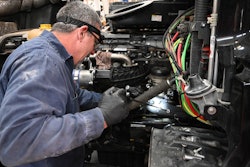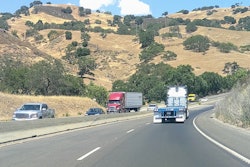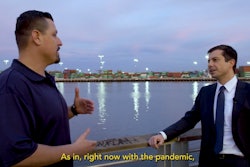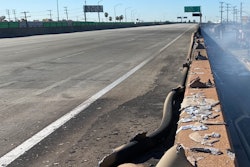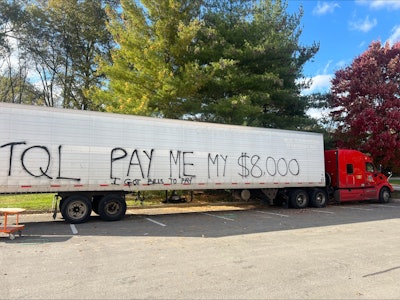
Born from the heated conflict between between carriers and brokers in a down freight market, the National Owner Operators Association has burst on the scene in 2023 with some notable headlines in its wake.
NOOA's longstanding boycott of TQL and other big brokers comes to mind. As does the announced "national shutdown." And then of course a NOOA member's viral livestreaming of a debt collection visit to TQL's Ohio headquarters.
That's all from an organization that only officially got it's 501(c)3 nonprofit status in June. Mike Boston, the Strasburg, Pennsylvania-based owner-operator at the helm, was just an owner-op who administered a trucking-focused Facebook page a year ago, but now he's one of trucking's loudest voices of protest.
The big brokers, according to Boston, are "committing fraud" with cargo claims "offsetting" contract clauses, by manipulating rates on their platforms. (More on how he views the mechanics of that here.) Not everyone agrees with that message, yet it's found a home with about 40,000 or so members of NOOA's Facebook page, where broker nonpayment remains a constant topic of discussion.
Boston shared his own broker nonpayment horror story with the group some time back. The response was deafening.

"My Facebook turned into a MeToo movement," he said.
Since then, he said he's met with Reps and Senators both in person and via Zoom, and NOOA has grown into a full-fledged association.
[Related: D.C. demonstrators get face-to-face with FMCSA administrator]
So how's the shutdown going?
Boston previously estimated some 20,000 owner-ops might shut down in support of NOOA's November 1 call for urgent action on broker transparency. NOOA's letter to the DOT threatened the shutdown to "draw attention to the critical issue of Congress' failure to act" on enforcing 49 Code of Federal Regulations 371.3, which requires freight brokers to keep and report specific records of each transaction, and make those records available to all transaction parties.
FMCSA particularly drew the ire of NOOA -- and others calling for broker transparency -- when it recently announced a delay of promised action on possibly strengthening 371.3 and its enforcement until October 31, 2024.
Three weeks later, Boston said he's still shut down, and has been since March, around the time of the TQL boycott announcement.
Boston admitted "there’s no way for me to know who is shut down and who is not," and pointed out that many owner-ops currently "have shut down because they can’t afford to run their trucks in this market," or for maintenance reasons.
"We’re not a union, we’re an association," said Boston.
But even short of store shelves running empty and a critical mass of drivers shutting down, Boston did point to concrete success from the letter to regulators. "We had a meeting with the DOT and the FMCSA for a few different reasons, mostly because of an issue with an owner-op concerning TQL," said Boston. "We were very appreciative of them reaching out to us and they have been communicating with us regularly."
As far as group membership goes, Boston said NOOA's still in it's infancy. Membership costs $125 per quarter, and the association offers "about 35 different services," Boston said. NOOA has been "bleeding members" in the down market.
"I wish that we did have more members, we could do a lot more advocacy," he said. "We wrote the website out in May and started this in June."
But Boston said NOOA's advocacy extended beyond official membership. "If someone needs help we're gonna help them," he said. "If it's an unjust FreightGuard or just help finding reasonable insurance, we're gonna help them."
NOOA offers referrals to services like dispatchers, maintenance support, legal support and debt collection, too.
Jennifer Chrestman, an associate at Tucker & Ablin, NOOA's corporate debt collection associate, said she's worked as a driver before, and her firm is aligned on NOOA's mission.
"We work for the benefit of all in the trucking industry, but primarily supporting carriers that are too small to have their own teams" for debt collection, she said. Boston added that NOOA-affiliated carriers have gone after brokers and shippers in some cases for as little as $300, and have won.
"When it comes to double brokers and scam brokers, it's a lot easier than one-on-one direct brokers that just might not have the money," said Chrestman.
NOOA's federal priorities include demanding action on broker transparency and supporting a law in the House that would ban federal pursuit of a mandate to use speed limiters in trucks. Boston said he's currently trying to establish with the DOT a better system for lodging complaints against brokers. FMCSA's current reporting system has also been criticized by the DOT Office of Inspector General in recent memory.
[Related: How carriers and brokers can work to combat double brokering: Potential red flags, more]
Toward the end of last year, FMCSA Administrator Robin Hutcheson told Overdrive the regulator was looking at "closing some loopholes," but that the project was a "long lead thing, and that can be frustrating."
NOOA has taken up that fight, among several others, and Boston said he looks forward to "continuing our open line of communication," with FMCSA and DOT. "That's all we can hope for."
Finally, Boston recounted that day when NOOA member and owner-op Gabriel Scott chose to make a scene at TQL. Despite texting with him and being on the phone with him leading up to the protest, "it was a shock," he said. Nonetheless, Boston told Scott that if he needed it, 20 other trucks would come join him.
"That's not me. I don't personally have 20 trucks," Boston said. "That's 20 truck owners that called me and said, 'If he goes, I'll be right behind him.' I'm just relaying the message. That's owner-operators speaking out."

